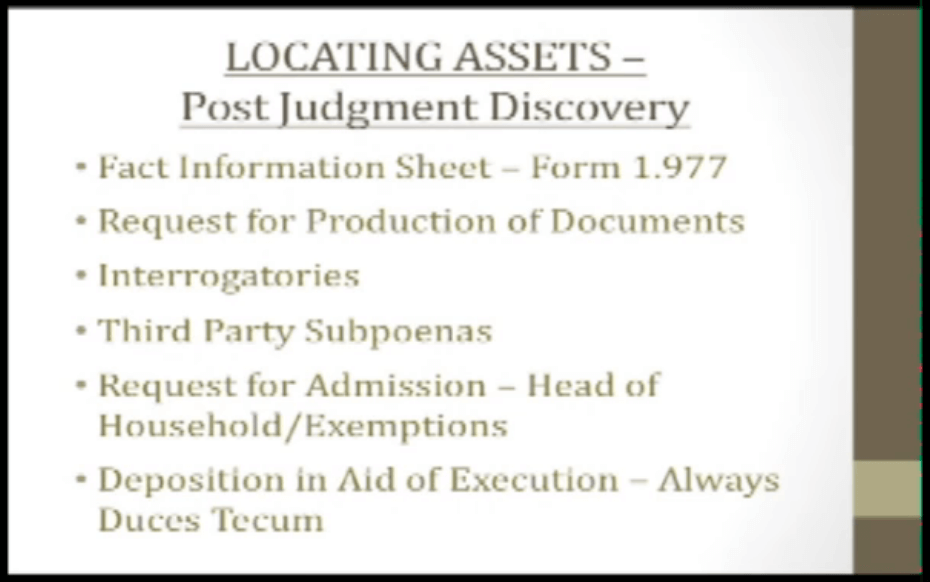Congratulations! The court has ruled in your favor and awarded a favorable judgment. However, there is no contact with the defendant and it’s not clear what assets are in play. Therefore, you need an effective plan on how to aggressively collect the judgement due–but without violating federal or state laws regarding collection practices. This video presentation recorded by Charles B. Jimerson provides an overview of collections law. As a result, it can help you understand the necessary steps to perfect and collect the judgment, including postjudgment discovery, garnishment or attachment.
To access the presentation, visit YouTube or click play on the embedded image below. The length of the presentation is 1:16:48.
Locating Assets: Presuit
Without the underlying assets to collect, a judgment is not worth the paper it is printed on. In fact, a piece of blank piece of paper is probably more valuable because you can actually use it for something productive. Therefore, it is an important first step to determine assets involved. Otherwise, you are unlikely to be paid. Information which can be helpful in identifying the amount of assets include:
- credit application and file;
- credit report;
- public records (licenses, corporations, judgments, pending court cases, taxes, SEC for public companies);
- real estate records;
- secured transaction registry – UCC (if inventory was used as collateral by the creditor)
- motor vehicle records (www.flhsmv.gov)
- financial statement / references;
- banking information / checks; and
- a client’s personal knowledge.
While all of these information sources are probed, it’s imperative to be constantly mindful of the client’s end goal. Otherwise, you may miss something. It’s easy to miss small things. Therefore, by keeping their goal in mind you are more likely to unearth potentially valuable evidence used to collect the judgment. Additional informal methods you might use to gather helpful information is:
- social media (Facebook, Instagram, Google – search for pictures);
- pay websites (Lexis Nexis, Westlaw, Accurint and Docusearch); and
- private investigators (expensive but usually worth the investment, especially for large judgments, as well as difficult judgment debtors).
Locating Assets: Postjudgment
After you have received judgment, always follow the rules of civil procedure. Otherwise, there may be negative consequences. In fact, there are several great remedies to aid creditors in discovery without stepping over the line. Charlie reviews many of them and how each can help improve likelihood of collection.
Additional Collections Law Subjects For Consideration When You Collect The Judgment
The presentation continues by describing bankruptcy basics for creditor’s rights counsel and Fair Debt Collection Practices Act compliance. Always avoid prohibited conduct. Also, remember to follow required conduct. As a result, you are most likely to collect the judgment that is due.

